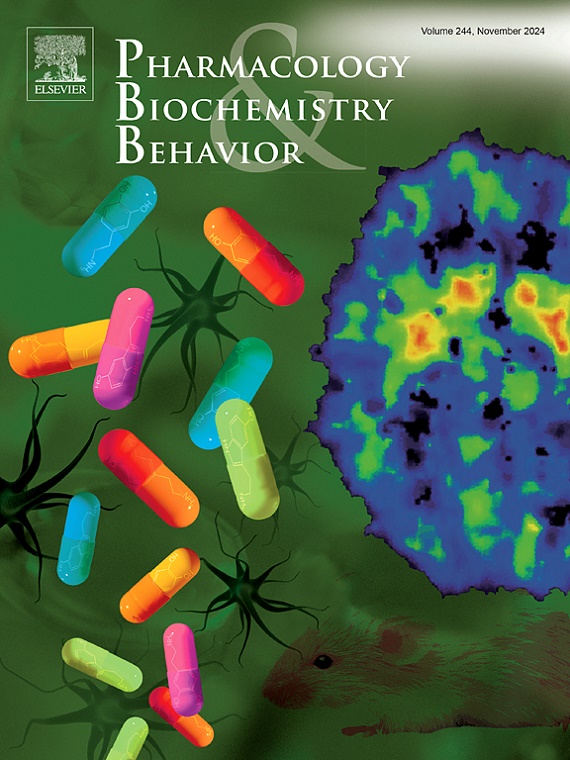Switching from menthol to non-menthol cigarettes does not impact acute responses to intravenous nicotine
IF 3.3
3区 心理学
Q1 BEHAVIORAL SCIENCES
引用次数: 0
Abstract
Background
Limited research exists on how switching from menthol to non-menthol cigarettes affects the acute response to nicotine for individuals who smoke menthol cigarettes. Such research can inform public health strategies to reduce smoking prevalence.
Aims
This study investigated whether switching from menthol to non-menthol cigarettes for two weeks alters the acute responses to intravenous nicotine infusions delivered at different rates. We assessed changes in subjective drug effects, smoking urges, withdrawal severity, heart rate, and performance on the Continuous Performance Test (CPT) (primary outcomes); as well as nicotine biomarker blood levels (ng/ml) of nicotine, cotinine, and nicotine metabolite ratio (NMR; hydroxycotinine/cotinine), and cigarette consumption (secondary outcomes).
Methods
Sixteen menthol-preferring individuals who smoke cigarettes were randomized to a sequence of menthol or non-menthol cigarette smoking conditions for 2 weeks (Phase 1) and then switched to the other condition for another 2 weeks (Phase 2). During week 2 of each phase, an experimental session was held. During the experimental sessions, participants were given a total of 3 infusions, one saline and two nicotine infusions delivered at different rates (1 mg nicotine delivered over 2.5- and 5-min). Each infusion period lasted 10 min, with saline administered for the remainder of the time after the 2.5- and 5-min nicotine infusions. Following the first session, participants crossed over to the other smoking condition.
Results
Switching to non-menthol cigarettes led to a decrease in daily cigarette smoking (p < .05). However, this switch did not appear to affect the severity of tobacco withdrawal, urges to smoke, or the subjective and heart rate responses to IV nicotine administration (p > .05).
Conclusions
These findings suggest that switching from menthol to non-menthol cigarettes is feasible without significantly altering the individual's response to nicotine. Further, there may be a potential public health benefit through reduced cigarette consumption.
从薄荷香烟转向不含薄荷香烟不会影响静脉注射尼古丁的急性反应
关于从薄荷香烟转向非薄荷香烟如何影响吸薄荷香烟的人对尼古丁的急性反应的研究有限。这种研究可以为公共卫生战略提供信息,以减少吸烟率。目的:本研究调查了在两周内从薄荷香烟切换到非薄荷香烟是否会改变静脉注射尼古丁的急性反应。我们评估了主观药物效应、吸烟冲动、戒断严重程度、心率和持续表现测试(CPT)表现的变化(主要结局);以及尼古丁、可替宁的血液生物标志物水平(ng/ml)和尼古丁代谢物比率(NMR;羟可替宁/可替宁)和吸烟(次要结局)。方法将16名嗜薄荷醇者随机分为两组(第一阶段),分别吸烟薄荷醇组和非薄荷醇组,两周后切换到另一组(第二阶段)。在每一阶段的第二周进行一次实验。在实验期间,参与者共接受3次输注,1次生理盐水输注和2次尼古丁输注,输注速度不同(1毫克尼古丁在2.5分钟和5分钟内输注)。每次输注持续10分钟,在2.5分钟和5分钟尼古丁输注后的剩余时间给予生理盐水。在第一阶段之后,参与者转入另一种吸烟状态。结果改用不含薄荷醇的香烟导致每日吸烟量减少(p <;. 05)。然而,这种转变似乎并没有影响戒烟的严重程度,吸烟的冲动,或对静脉注射尼古丁的主观和心率反应(p >;. 05)。这些发现表明,从薄荷香烟转向不含薄荷香烟是可行的,而不会显著改变个人对尼古丁的反应。此外,减少香烟消费可能对公众健康有潜在的好处。
本文章由计算机程序翻译,如有差异,请以英文原文为准。
求助全文
约1分钟内获得全文
求助全文
来源期刊
CiteScore
6.40
自引率
2.80%
发文量
122
审稿时长
38 days
期刊介绍:
Pharmacology Biochemistry & Behavior publishes original reports in the areas of pharmacology and biochemistry in which the primary emphasis and theoretical context are behavioral. Contributions may involve clinical, preclinical, or basic research. Purely biochemical or toxicology studies will not be published. Papers describing the behavioral effects of novel drugs in models of psychiatric, neurological and cognitive disorders, and central pain must include a positive control unless the paper is on a disease where such a drug is not available yet. Papers focusing on physiological processes (e.g., peripheral pain mechanisms, body temperature regulation, seizure activity) are not accepted as we would like to retain the focus of Pharmacology Biochemistry & Behavior on behavior and its interaction with the biochemistry and neurochemistry of the central nervous system. Papers describing the effects of plant materials are generally not considered, unless the active ingredients are studied, the extraction method is well described, the doses tested are known, and clear and definite experimental evidence on the mechanism of action of the active ingredients is provided.

 求助内容:
求助内容: 应助结果提醒方式:
应助结果提醒方式:


